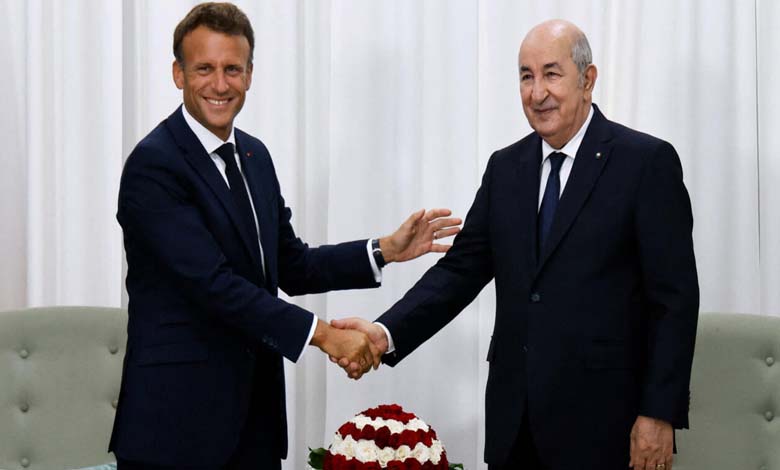Agreement Between Macron and Tebboune to Resume Dialogue in the First Breakthrough of a Prolonged Crisis

The Algerian President and his French counterpart emphasize the importance of restoring a balanced dialogue between the two countries as key partners and major players in Europe and Africa.
Algerian President Abdelmadjid Tebboune and his French counterpart Emmanuel Macron agreed on Monday to immediately resume dialogue and security cooperation through the “Algiers Declaration” issued in August 2022. This step indicates both parties’ willingness to ease tensions and establish a framework to resolve the crisis after months of diplomatic strain between Algeria and France.
-
France and Algeria Closer Than Ever to Diplomatic Break
-
France tightens visa requirements for Tunisian, Moroccan and Algerian citizens
In a statement, the Algerian presidency said that the two leaders had a “lengthy, frank, and friendly discussion about the state of bilateral relations and the tensions that have accumulated in recent months.” It was their first communication since July, and they agreed to hold a meeting soon, although no specific date was set.
The two presidents reaffirmed their desire to “resume the constructive dialogue established through the Algiers Declaration of August 2022,” which led to significant milestones, including the creation of a joint committee of French and Algerian historians, the repatriation of the remains of resistance martyrs, and France’s acknowledgment of responsibility for the killings of martyrs Ali Boumendjel and Larbi Ben M’hidi.
-
Moroccan Diplomatic Expulsion Reveals Algeria’s Discontent with Rabat’s Successes
-
Tebboune Backs Down from Escalation Policy with France
On March 3, 2021, Macron acknowledged France’s responsibility for the torture and assassination of Algerian lawyer and activist Ali Boumendjel in 1957. Previously, the official French narrative claimed that Boumendjel had committed suicide by jumping from a high floor during interrogation.
On November 1, 2024, Macron also admitted to France’s responsibility for the killing of Mohamed Larbi Ben M’hidi, one of the prominent leaders of Algeria’s liberation struggle against French colonial rule. This acknowledgment coincided with the 70th anniversary of the revolution’s outbreak.
-
Larcher’s Visit to the Moroccan Sahara Reflects France’s Interest in Strengthening Cooperation with Rabat
-
Legislative Initiative to Eliminate the French Version of the Official Gazette in Algeria
Before this, the official French position had falsely claimed that Ben M’hidi had “committed suicide” in his prison cell, despite General Aussaresses—nicknamed “the butcher” in Algeria—admitting in his 2000 memoirs that he had personally ordered the execution.
Macron has pursued a policy of gradually recognizing France’s colonial crimes in Algeria. On October 16, 2021, he condemned the brutal repression of the October 17, 1961, demonstrations in Paris, where the French police, under Maurice Papon’s command, killed over 12,000 Algerians, some of whom were thrown alive into the Seine River.
-
Extension of MINURSO Mission: Diplomatic Victory for Morocco and Setback for Algeria
-
Chaos Strikes Algerian Media: Exaggerated Propaganda for Tebboune Involves a Daily Newspaper
According to the Algerian statement, the two presidents agreed on the “strength of the ties, particularly the human connections between Algeria and France, as well as the strategic and security interests of both nations, and the challenges and crises facing Europe, the Mediterranean region, and Africa.”
They emphasized the importance of “restoring a balanced dialogue between the two countries, given their roles as key partners and major players in Europe and Africa, and their full commitment to international legitimacy and the principles outlined in the United Nations Charter.”
-
France Stimulates Its Companies with Financial Support to Invest in the Moroccan Sahara
-
France opens up to investment in the Moroccan Sahara
Both leaders agreed to “work closely and in a spirit of friendship to inject new ambition into this bilateral relationship, ensuring a comprehensive approach to its various aspects and achieving the expected effectiveness and outcomes.” They also decided to “immediately resume security cooperation between the two countries.”
Furthermore, they stressed “the urgent need to restore migration cooperation in a reliable, smooth, and effective manner, addressing all aspects of human movement between the two countries with a results-driven approach that meets both nations’ concerns.”
-
More than half of French people consider Algeria a terrorist threat
-
Evolution in Moroccan-French relations despite some unresolved and mysterious issues
The presidents praised the progress made by the joint committee of historians, which was established following Macron’s visit to Algeria in August 2022. They reaffirmed their commitment to continuing and completing the work on historical memory in a spirit of reconciliation and rebuilding relations, as they had previously pledged.
The statement specified that the joint committee of historians “will immediately resume its work and hold its next meeting in France, with concrete findings and proposals to be submitted to both presidents before the summer of 2025.”
-
France expresses a strong desire to end tensions with Morocco
-
France’s appointment of Stéphane Séjourné as Minister of Foreign Affairs is seen as an unfriendly gesture towards Morocco
Algeria-France relations have faced escalating tensions in recent months over several issues, notably France’s decision to deport Algerian migrants accused of inciting violence and disturbing public order—a move rejected by Algeria. Additionally, the case of French-Algerian writer Boualem Sansal, who has been detained in Algeria since mid-November 2023, has been used as a pressure point against the Algerian government.
Observers believe that the main trigger for the recent tensions was the growing rapprochement between France and Morocco, particularly Paris’ recognition of Morocco’s sovereignty over Moroccan Sahara. Macron pledged to lead international efforts to support Morocco’s autonomy plan, which was proposed by Rabat in 2007 and has gained increasing backing from influential nations like the United States. In response, Algeria recalled its ambassador from Paris in July 2024, following France’s endorsement of Morocco’s autonomy proposal as a resolution to the Moroccan Sahara conflict.












